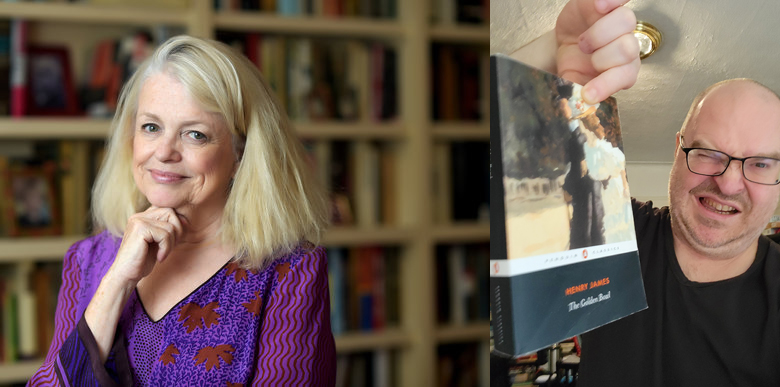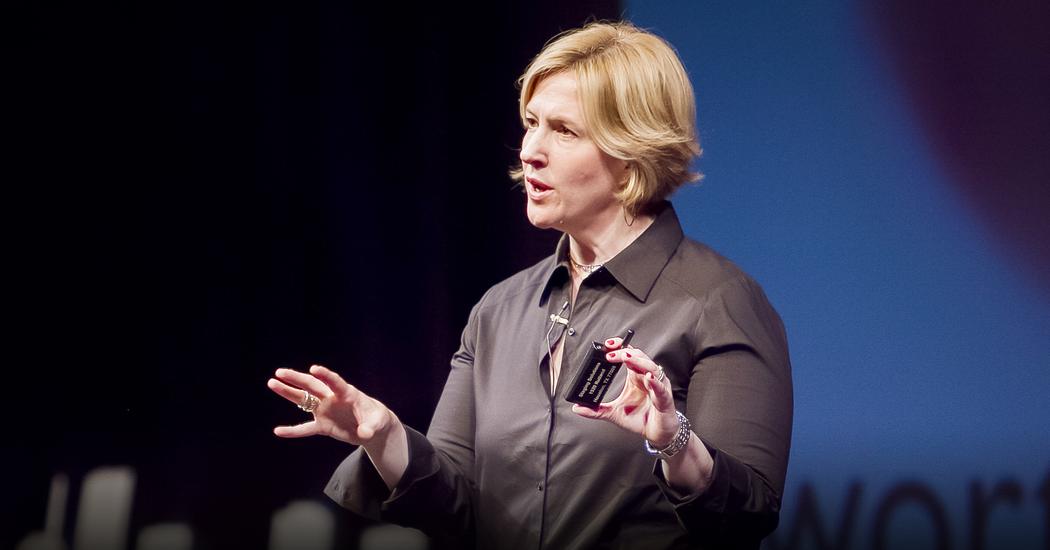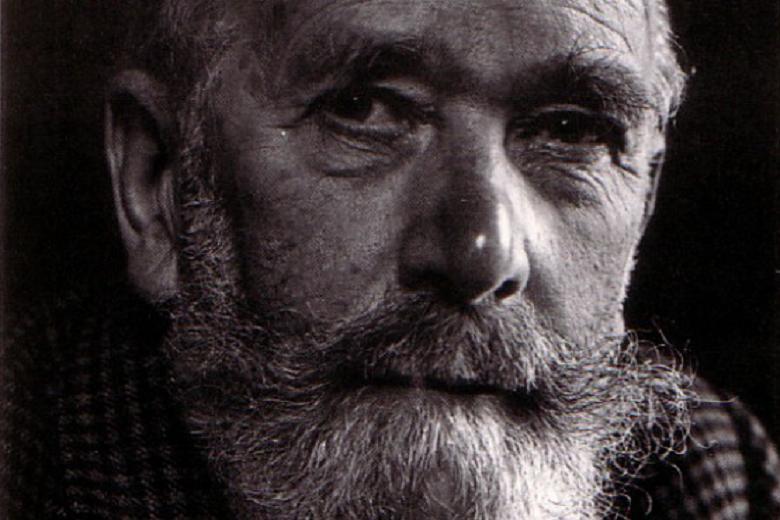I have read The Golden Bowl three times. I have read The Ambassadors three times. I have read The Wings of the Dove once. Despite these good faith reading efforts, I have detested Henry James — particularly late Henry James — with the force of a thousand suns. I find his interminable sentences to be tedious. I find his behavioral observations to be superficial. I would much rather be locked in a room with a garrulous chowderhead for a three-day weekend than deal with this hideous “Master” in any form. In short, I cannot stand Henry James.
Unfortunately, I’m in something of a pickle. You see, because of my years-long Modern Library Reading Challenge project, I am fated to read those last three triple-deckers written by James at some point in the next few years. And I am a man of my word.
And because I possess a highly stubborn temperament, I started contacting people who were obsessed with Henry James, hoping that they might be able to help me.
Thankfully, there was succor from an unanticipated source! When novelist Dinitia Smith heard about my Henry James problem, she swiftly offered to help me see the light. She had, after all, written The Prince, a modern day retelling of The Golden Bowl. What follows is a modest excerpt from our lengthy conversation, which occurred, rather fittingly, in the early days of Russia’s invasion of Ukraine — a point where nearly everyone in the world was in a moribund mood. The full podcast of my conversation with Smith (as well as my good faith efforts to overcome Henry James’s tyranny) will be released sometime in the next week.
CORRESPONDENT: So there are two reasons why I’m talking to you. First, and most importantly, I’m here to unpack your book. Second, I have a problem with Henry James. I have tried. I have read him repeatedly. And he just doesn’t stick. And maybe one good way of initiating this conversation is to discuss what the appeal of Henry James is for you and how you approached writing this book [The Prince] with the so-called “Master” – what a debatable label!– in mind?
SMITH: Alright, I’ll begin with why I chose to do this. And I’ll discuss with you — or tell you my feeling about Henry James. First of all, Henry James — as his career reached a kind of end — his last three books were very, very difficult books. The most difficult was the book, The Golden Bowl, which is his last complete novel. And it is difficult. Now I read Henry James in a certain way. I read him almost as if it were poetry. Um, it’s not. I don’t see a linear form in this. The last three novels, actually, are told from the point of view of the characters’s consciousness. Mostly they don’t speak very much. So the appeal? First of all, the difficulty I admit. And there is almost no novel as difficult as The Golden Bowl. But what appealed to me about The Golden Bowl is that it is about secrets. James’s novel is about a wealthy family with terrible secrets and it fascinates me how they solve these secrets.
And from that, I took my own novel. I borrowed the outlines of James’s novel for The Prince. And I then transferred that story to the 21st century. And, by nature of having been a journalist, I write in what could be called ordinary English. So my novel was very different. The Prince, in style, is completely different.
CORRESPONDENT: Oh yeah. And I noticed that, in the first third of the book, you made this attempt to mimic Henry James’s sentences. You had the commas and the clauses and all that. But you were also mercifully brief. You didn’t have page-long sentences. And, as the book carried on, I noticed that you increasingly drifted away from this style. I’m wondering: Was this an attempt initially to write a pastiche? What happened here?
SMITH: Very, very good question. First of all, in The Prince, I wasn’t aware of mimicking his style. I thought the style — even at the beginning of The Prince — was fairly ordinary. I do go inside the character’s head a lot. I tell you what he or she is thinking. We see that with the character of the Prince, for example, at the beginning of the book. But I will tell you that, in the past, when I have been reading a lot of James and doing my own work, his style infects me. And I have to stop myself. But here I was very conscious in The Prince of telling a story in our time. And I love a good story. And that’s what interested me about my own book.
But Henry James – early James — is much easier to read. Late James, you have to decide that you’re just going to read this like poetry. Meaning certain words and phrases will stand out buried in very long sentences and paragraphs.
And you pick those out. Also, in Henry James, in The Golden Bowl, there is this element of mystery. You’re looking for meaning in this. I really didn’t have that in my novel, The Prince. What was pushing the novel forward was an illicit relationship between an impoverished Italian prince and his old girlfriend, while he is married to a very wealthy woman, and what happens in this love affair. Because this woman who he eventually has an affair with marries his father-in-law. The novel is about what happens when these secrets come to the surface and how the family — the wealthy patriarch and his daughter — solve this problem and what they know.
One thing I borrowed from James was the whole notion of gradual awareness and not wanting to admit what you see. As as someone once said, love is about not knowing and acknowledging. So I used to write this novel.
CORRESPONDENT: Well, you know, I actually did reread The Golden Bowl before this conversation. I spent two days rereading it. I nearly lost my will to live, but I did reread it. One criticism I have of The Golden Bowl is that these characters talk about nothing other than the marriages of the other characters. And it’s this incredibly annoying gossipfest. Particularly with the Assignhams, who are just annoying as hell to me. I mean, just shut up! It’s like I’m stuck on vacation, listening to these people gabbing — with that terrible dialogue and those terrible sentences. They don’t have anything else going on with their lives!
But in your book, you have Federico, who’s the Amerigo of your book, playing music in a band. He’s smoking pot. You have Emily, the Maggie Verver of your book, talking about taking classes, signing up for Teach for America. There’s a prenuptial agreement. There’s some concern with the President speaking about North Korea. I have to thank you for making your book readable. Unlike Henry James. Because it’s actually realistic — the so-called mystery. And then you have the father-in-law, Henry, checking out the, the Charlotte character, Christina. And it’s far more plausible when it comes to human behavior, as far as I’m concerned. It seems to me that you were aware that Henry James was a bit one-note when it came to the reality that people have lives other than gossiping. You know what I mean?
SMITH: Yes, I do. Because, rarely in Henry James, do you encounter a character who actually has a job. Very rare.
CORRESPONDENT: I know!
SMITH: And a lot of this is because James was a precursor of what we call modernism. So a lot of this takes place within the consciousness of the characters. But there is that element. There’s a muffled quality in his books. You do get a sense of these grand houses, but in my book I actually had fun in The Prince, creating these grand houses in more vivid terms.
CORRESPONDENT: And thank you for that. Because The Golden Bowl is anything but fun. I would not call these muscled sentences. I would call them, “Hey, you can say this in one third of the length, buddy!” You know?
SMITH: Well, you know, Ed, you’re not in the minority here. There are very, very literary people who have trouble with that book. In fact, William James — Henry’s brother.
CORRESPONDENT: Yes! He’s much better.
SMITH: He hated the book.
CORRESPONDENT: William James. I love! I have no problem with him. I love Thackeray. I love Dickens. I love Tolstoy. I love all of these great pre-modern novelists. But it’s Henry James who just makes me want to asphyxiate something. I mean, the last time I reread The Ambassadors — I kid you not! — I had a nightmare in which I was strangled by the sentences of James and I woke up in a cold sweat. So how can you help someone like me who wants to like Henry James? And I do like the early Henry James. But late James? This guy is a drunk at a bar, except he’s a little bit more highfalutin. He’s rambling incessantly. For God’s sake, just shut the hell up!
SMITH: You know, you’re making me laugh very hard. First of all, you mentioned his class structure. This is relevant to my novel, The Prince. In his novels, as I said, nobody ever has a job. They always take place on estates or in grand houses or plots. They rarely take place in the United States. There are scenes in the United States, but usually they move to Europe. He was writing about maybe the second generation of the robber baron class — the antecedents of those people, the rough, tough people who built the railroads.
And then they had offspring who became more educated. Who began to collect art — much like the father figure in my novel, The Prince. So there is that truth. And I had a background as a filmmaker, which made me more interested in scenes.
CORRESPONDENT: I went to film school myself. So maybe you and I can find a common point? How does a film mind grasp the portentous length of Henry James’s oppressive sentences?
SMITH: You’re making me laugh as I discuss this. And I want to tell you you’re not alone. Maybe people will read my novel, The Prince, to get a sense of what his novels were about. Because what I borrowed from James is essentially the structure and the ideas. My character — the wealthy father — is a descendant of the robber barons. But, at this point, he’s gone to law school and he’s very conscious of his wealth and he becomes a public interest lawyer and he does very good things. Although he moves like this, you the wealth is in the air. He birthed his daughter, who is one of the characters in my novel.
Emily is her name. She did go to a very good school. She is smart, but, in that environment, she has had to hide her intelligence to some extent. So she’s a certain kind of woman you find in that world. But this was part of my effort to give life to these people, that perhaps is lacking in James. Although I do love Henry James.
CORRESPONDENT: Clearly. It’s very clear reading your book that you are a Henry James nerd. And that’s great! But at the same time, you are also very honest about Henry James’s fallacies.
SMITH: Yes, I think I am. You have to understand that, in writing The Prince, I spent one year rereading The Golden Bowl taking it apart.
CORRESPONDENT: Wow! How many times did you reread it?
SMITH: Well, in this case, because I was looking at it with the idea of writing a novel, it was probably one reading. But I went back to certain chapters. I sat on the couch and read through Henry James. I was examining it, thinking about what each chapter in my own novel, The Prince, could be.
Thinking about how I could make these characters. There are certain elements in The Prince that are a continuation of James. For example, many wealthy descendants of the robber barons. Think of the Rockefellers or the Vanderbilts. They collected art. They made art museums or started them.
And I put that into my novel. We know in Henry James that he is going to involve himself in art. So I was interested in how this would happen with the new generations — in regard to the Rockefeller family, which is a good analogy.
I know immensely wealthy people who are very private about their wealth. But in the Rockefeller family, the newest generation — or the generation that’s in their sixties and seventies — they became doctors and environmentalists. They had to live with the weight of the original Rockefeller, who was not a very nice man.
So that interested me. It was fun to create a world. In The Prince, I borrowed the notion of a private island It’s sort of primeval place, which was fun. And I created a house for each of them. I actually researched the decor these houses might have had. Because these houses are a lot bigger than my house!
CORRESPONDENT: I’m getting the sense that you actually did more research on the robber barons of the Gilded Age. More so than looking to The Golden Bowl itself. Would that be safe to say?
SMITH: Absolutely.
CORRESPONDENT: That would explain why your novel is readable! And Henry James’s The Golden Bowl is not! (laughs)
SMITH: Well, thank you. For The Prince, I should tell you that my husband is an historian. He wrote a biography of Andrew Carnegie. And from that, and discussions with him, I learned a great deal about the robber barons.
CORRESPONDENT: Oh yeah. Ron Chernow’s The House of Morgan is great too.
SMITH: Yes! Oh my. Yes. Very, very. And there have been biographies of Frick. None of these guys were very nice.
CORRESPONDENT: Well, you had to be a bit of a dick in order the hoard all that wealth, right?
SMITH: Not only that, but to gain the wealth. When you think of Frick and the strike. The Homestead Strike, where, you know, he called the Pinkertons on these people.
CORRESPONDENT: Yeah!
SMITH: Some people died and Carnegie was a participant. I have met some descendants of the Carnegie family. They couldn’t be more different from him.
CORRESPONDENT: They actually had a heart. That’s good to know.
SMITH: Yeah. Right. It was fun to create this private island. I was outraged that somebody could have a private island that big in the middle of the Long Island Sound!
I used research about a place called Gardiners Island — this huge place that belongs to the Gardiner family, which I had visited. So in the middle of the Long Island Sound, which is filled with boats and with some pollution, there is this primeval place with trees, an old manor house, and beautiful wildlife.
And so this purity is analogous to the purity of my character, Emily, in her realization of what’s going on. A lot of this novel — my novel and James’s — is about her growth. And the solution to this problem, which I’d rather not give away, is almost monstrous.
CORRESPONDENT: Going back to the whole Henry James problem, here’s the thing. Right now, I’m actually going through all of Edith Wharton. And I love her. I love her. I have no such problems with her. She’s amazing. The House of Mirth. The Age of Innocence. All those ghost stories. She depicts class far more intelligently and far more subtly and with far greater nuance than Henry James. And not only that. I have to ding Henry James for taking ten years to befriend her after Edith Wharton was saying, “Hey, Henry! I love you!” And then he takes ten years and does that false modesty thing. Please give me a reason why I should give Henry James another shot. You talk about the mystery and the ambiguity. I look at his sentences and honestly I see something that is completely on the nose. I don’t see characters here who have the great vivacity of Lily Bart from The House of Mirth or any of these other great classics of that era. You know?
SMITH: Well, you know, I have to agree with you in some bizarre way. I love Edith Wharton. Of course they were friends. They became friends. He was kinda snotty about her first short story. But they became very close. She admired him so much. But I think you’re right in some way. With regard to The Golden Bowl, the only way to see it is as a mystery. But you have to go through these filaments of language and find the truth underneath it. And you have to have a taste for it. And I happen to like being surrounded by the miasma of Henry James, But Wharton is a great, great novelist. She tells you a story in plain English that you can lose yourself in. And I think human beings love stories. They tell stories every day. And my primary goal as a novelist is to tell a good story. So let’s just say that Henry James is a hobby of mine that not everyone shares.
CORRESPONDENT: I know. And look, I want to cultivate this taste, Dinitia, but I am having incredible difficulty with this late period — especially these last three novels. To me, Henry James is the most offensive mansplainer in all of American literature. Am I just missing some DNA that will allow me to appreciate Henry James? Come on! Stump for this guy for me!
SMITH: You make me laugh. I’ve learned as a novelist — and as a sort of literary person — just how many of my literary friends don’t like certain authors.
For example, I tend to not like a lot of contemporary novels, which are kind of postmodern, fragmentary, and usually about a woman with a husband betraying her. Or who doesn’t like her children. I think we can all be forgiven for not liking these novels, which are very, very successful right now.
But I think we all can be forgiven. I might discuss books with my friends and discover. There are certain authors that they just can’t abide by and they are very talented. I’ve learned to forgive myself when I find the authors that I don’t like. I suggest you forgive yourself and leave them alone and read Edith Wharton!


 The men went to war. Their psyches were scarred and sotted by the sights and sounds of death and dreary dissolution — all doled out at a hellish and unprecedented new normal. Machine guns, mustard gas, the ear-piercing shrieks of shrapnel and shells, rats gnawing on nearby corpses. The lush fields of France anfracted into a dark flat wasteland.
The men went to war. Their psyches were scarred and sotted by the sights and sounds of death and dreary dissolution — all doled out at a hellish and unprecedented new normal. Machine guns, mustard gas, the ear-piercing shrieks of shrapnel and shells, rats gnawing on nearby corpses. The lush fields of France anfracted into a dark flat wasteland. 


 Thankfully, I had no such qualms with High Wind; in large part because, unlike Golding, Hughes isn’t so obsessed with plugging in values — the novel as a Sudoku puzzle? — to uphold his Great AllegoryTM (and thus literary posterity). The older you get as a reader, the more you welcome the fresh shock of the visceral: those exotic and sometimes unsettling voices you may not encounter in the real world.
Thankfully, I had no such qualms with High Wind; in large part because, unlike Golding, Hughes isn’t so obsessed with plugging in values — the novel as a Sudoku puzzle? — to uphold his Great AllegoryTM (and thus literary posterity). The older you get as a reader, the more you welcome the fresh shock of the visceral: those exotic and sometimes unsettling voices you may not encounter in the real world.